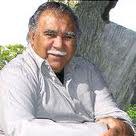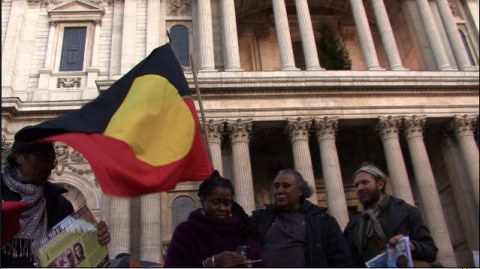London, 9 December 11 - - Euahlayi tribal leader Michael Anderson reports from London that over the next few days he will have confirmed Aboriginal sovereign status within Australia under international law. He writes in a media release that the High Court Mabo judgment (No. 2) gives Aborigines rights in ownership and title to all Crown lands in Australia, affirmed from the Order in Council from England in 1875 through the Pacific Islanders Protection Act.
The trained lawyer and last survivor of the four young Black Power men who set up the Aboriginal Embassy in Canberra in 1972 states: “Presently I can say that the shutting down of the National Aboriginal Conference (NAC) in 1985 was not about the NAC’s failure to represent their constituency, but rather it was about its success in beginning to shatter the skeletal framework of the Australian State, later referred to in the High Court Mabo judgment.”
“So far my trip to London has made it patently clear that an Order in Council is law and can only be taken away by another Order in Council from the monarch and cannot be taken away by Parliament,” the activist writes.
“Part of the land rights struggle that we now face is to gain compensation for the land that has been usurped by force from our nations. As Aboriginal peoples we must now truly understand that Australia’s claim in title to our lands, waters and natural wealth is more than ‘on shaky ground’.”
Michael Anderson writes that it is now imperative that Aborigines unite and rebuild as sovereign independent nations to claim their sovereign title and rights throughout Australia.
“This will be a major political and legal fight, but it is our future for not just us, but for our children and our grandchildren.”
Michael Anderson’s statement in full:
The High Court Mabo judgment (No. 2) only got it half right; by this I mean that the sovereign status of our people gives us rights in ownership and title to all Crown lands in Australia. This is affirmed from the Order in Council from England in 1875 through the Pacific Islanders Protection Act.
So far my trip to London has made it patently clear that an Order in Council is law and can only be taken away by another Order in Council from the monarch and cannot be taken away by Parliament.
Where we have been cheated by the Australian Parliament was through their act to engage the “Magnificent Seven” Aborigines to work with the Government to formulate a code of laws to restrict our ability to take ownership as sovereign Peoples to the remaining lands and waters that had not been usurped. That is, these lands are known in Australia as ‘Crown lands’ and they belong to us unencumbered as sovereign nations’ land. The Magnificent Seven, without being fully informed, worked to circumvent our ownership of these lands.
The High Court Mabo judgment said that all Crown lands were available for claim. Clearly the Wilson v Anderson case of 2002 was Australia’s stand against Aboriginal sovereign rights to secure by statute State leasehold lands for non-Aboriginal people.
Part of the Land Rights struggle that we now face is to gain compensation for the land that has been usurped by force from our nations.
The doctrine of adverse possession is a possessory right by occupation and we Aboriginal Peoples, as sovereign true owners of the occupied lands, must now stand and fight for the right to be compensated. This compensation right must include compensatory measures for the wealth that the government gains through our naturally occurring resources.
Clearly the Samuel Griffith Society of lawyers, which protects Australian Constitution rights, got it right when they advised John Howard in 1998 that it would be at his government’s peril if they affirmed government ownership of natural resources in the Native Title Act or any other Act of the Australian State. One of the most important points made in this advice was that should Aborigines be successful in arguing their case for sovereignty then the Australia State would have to repay to Aboriginal Peoples all monies derived from the exploitation of our natural wealth. It goes without saying that the white legal experts in Australia are very wary and concerned about the High Court’s statement in Mabo when the judges referred to Australian State as having a skeletal framework. In this regard the High Court said:
42. The fiction by which the rights and interests of indigenous inhabitants in land were treated as non-existent was justified by a policy which has no place in the contemporary law of this country. The policy appears explicitly in the judgment of the Privy Council in In re Southern Rhodesia in rejecting an argument (66) ibid., at p 232 that the native people "were the owners of the unalienated lands long before either the Company or the Crown became concerned with them and from time immemorial ... and that the unalienated lands belonged to them still". Their Lordships replied (67) ibid., at p 234-
"the maintenance of their rights was fatally inconsistent with white settlement of the country, and yet white settlement was the object of the whole forward movement, pioneered by the Company and controlled by the Crown, and that object was successfully accomplished, with the result that the aboriginal system gave place to another prescribed by the Order in Council".
Whatever the justification advanced in earlier days for refusing to recognize the rights and interests in land of the indigenous inhabitants of settled colonies, an unjust and discriminatory doctrine of that kind can no longer be accepted. …
It is important to understand that the High Court in Mabo went on to say in para 42 that:
The expectations of the international community accord in this respect with the contemporary values of the Australian people. The opening up of international remedies to individuals pursuant to Australia's accession to the Optional Protocol to the International Covenant on Civil and Political Rights (68) See Communication 78/1980 in Selected Decisions of the Human Rights Committee under the Optional Protocol, vol.2, p 23 brings to bear on the common law the powerful influence of the Covenant and the international standards it imports. The common law does not necessarily conform with international law, but international law is a legitimate and important influence on the development of the common law, especially when international law declares the existence of universal human rights. A common law doctrine founded on unjust discrimination in the enjoyment of civil and political rights demands reconsideration. It is contrary both to international standards and to the fundamental values of our common law to entrench a discriminatory rule which, because of the supposed position on the scale of social organization of the indigenous inhabitants of a settled colony, denies them a right to occupy their traditional lands. It was such a rule which evoked from Deane J. (69) Gerhardy v. Brown [1985] HCA 11; (1985) 159 CLR 70, at p 149 the criticism that -"the common law of this land has still not reached the stage of retreat from injustice which the law of Illinois and Virginia had reached in 1823 when Marshall C.J., in Johnson v. McIntosh (70) (1823) 8 wheat, at p 574 (21 US , at p 253), accepted that, subject to the assertion of ultimate dominion (including the power to convey title by grant) by the State, the 'original inhabitants' should be recognized as having 'a legal as well as just claim' to retain the occupancy of their traditional lands".
43. However, recognition by our common law of the rights and interests in land of the indigenous inhabitants of a settled colony would be precluded if the recognition were to fracture a skeletal principle of our legal system. The proposition that the Crown became the beneficial owner of all colonial land on first settlement has been supported by more than a disregard of indigenous rights and interests. It is necessary to consider these other reasons for past disregard of indigenous rights and interests and then to return to a consideration of the question whether and in what way our contemporary common law recognizes such rights and interests in land. Crown title to colonies and Crown ownership of colonial land distinguished.
As Aboriginal Peoples we must now truly understand that Australia’s claim in title to our lands, waters and natural wealth is more than ‘on shaky ground’. The High Court Mabo decision has determined that:
44. In the trilogy of cases cited earlier in this judgment (71) Supra, pp 12-15: Attorney-General v. Brown; Randwick Corporation v. Rutledge; the Seas and Submerged Lands Case, it was said that colonial land became a royal demesne - that is, that the Crown became the absolute beneficial owner in possession of all colonial land - on first settlement, the event which conferred sovereignty on the Imperial Crown. Curiously, in Williams v. Attorney-General for New South Wales (72) [1913] HCA 33; (1913) 16 CLR 404, at p 439, Isaacs J. said it was unquestionable that -
"when Governor Phillip received his first Commission from
King George III. on 12th October 1786, the whole of the
lands of Australia were already in law the property of the
King of England".
Fortunately for Aboriginal Peoples, the Order in Council in the Pacific Islanders Protection Act 1875 clearly contradicts this assertion in para 44.
As Peoples it is now imperative that we unite and rebuild as sovereign independent nations, in order to claim our sovereign title and rights throughout Australia. This will be a major political and legal fight, but it is our future for not just us, but for our children and our grandchildren.
Over the next few days I will have confirmed our sovereign status within Australia under international law. Presently I can say that the shutting down of the National Aboriginal Conference (NAC) in 1985 was not about the NAC’s failure to represent their constituency, but rather it was about its success in beginning to shatter the skeletal framework of the Australian State, later referred to in the High Court Mabo judgment.
 Michael Anderson spoke on Human Rights Day at Occupy LSX (London Stock Exchange) outside St Paul's Cathedral. Hear the speech by clicking here.
Michael Anderson spoke on Human Rights Day at Occupy LSX (London Stock Exchange) outside St Paul's Cathedral. Hear the speech by clicking here.
Contact Michael Anderson ghillar29@gmail.com or +44 (0) 7401 442 453



Comments
Aboriginal sovereignty can work, would probably need treaties
It is my understanding that Aboriginal sovereignty is a possibility within Australian democracy because while the state is a sovereign entity, it can accommodate multiple sovereignties. This is evident in Australia where it is actually a federal system that works in combination with the individual state sovereign systems. From what I have learned Aboriginal sovereignty can work and would probably require treaties to be effective.